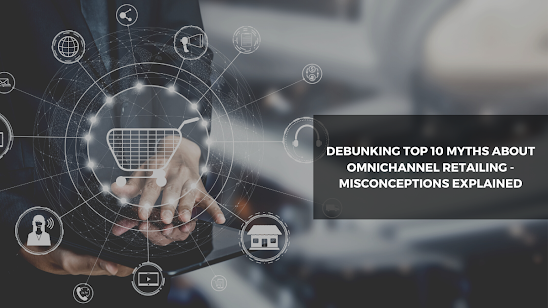Debunking top 10 Myths About Omnichannel Retailing - Misconceptions Explained
Myth #1: Omnichannel is Only for Big Brands
One of the biggest misconceptions about omnichannel retailing is that it is only for big brands with large budgets. However, this is far from the truth. Omnichannel retailing is a strategy that businesses of all sizes can implement. Small and medium-sized businesses can benefit from omnichannel retailing as it helps them reach more customers and provide a better shopping experience.
Myth #2: Omnichannel is Too Expensive
Another misconception is that omnichannel retailing is too expensive. While it is true that there are costs associated with implementing an omnichannel strategy, it is essential to remember that the benefits outweigh the costs. By providing a seamless shopping experience across all channels, businesses can increase customer loyalty, customer satisfaction, and ultimately revenue.
Myth #3: Omnichannel is Just About Technology
While technology is essential to omnichannel retailing, it is not the only factor. Omnichannel integration is a strategy that requires a shift in mindset and a focus on the customer experience. It involves integrating all channels to provide a seamless shopping experience for the customer, from browsing to purchase to post-purchase support.
Myth #4: Omnichannel is Only for Retail
Another myth about omnichannel retailing is that it is only relevant to businesses in the retail industry. However, this is not true. Any business that interacts with customers can benefit from omnichannel retailing. For example, a B2B company can use omnichannel retailing to provide a seamless experience for customers who want to purchase products online or through a sales representative.
Myth #5: Omnichannel is the Same as Multichannel
Omnichannel retailing often needs to be clarified with multichannel retailing. While multichannel retailing offers customers multiple channels to purchase from, omnichannel retailing takes it a step further by integrating all channels to provide a seamless shopping experience for the customer. In other words, omnichannel retailing provides a consistent experience across all channels, while multichannel retailing offers multiple channels to customers.
Myth #6: Omnichannel is Not Relevant for Certain Industries
Another myth about omnichannel retailing is that it needs to be more relevant for specific industries, such as healthcare or finance. However, this is not true. Any business that interacts with customers can benefit from omnichannel retailing. For example, a healthcare provider can use omnichannel retailing to provide a seamless experience for patients who want to schedule appointments, access medical records, or communicate with their doctors through multiple channels.
Myth #7: Omnichannel is Too Complicated
Implementing an omnichannel strategy may seem daunting initially, but it is not as complicated as it may seem. Businesses can successfully implement an omnichannel strategy by breaking it down into smaller steps and focusing on the customer experience. It is important to remember that omnichannel retailing is a journey, not a destination.
Myth #8: Omnichannel is a One-Time Investment
Implementing an omnichannel strategy is not a one-time investment. It requires ongoing maintenance and updates to meet changing customer needs and technological advancements. Businesses need to constantly analyze their omnichannel strategy and make improvements to ensure a seamless shopping experience for customers.
Myth #9: Omnichannel is Not Important for Customer Loyalty
Providing a seamless shopping experience across all channels is crucial for building customer loyalty. Customers expect businesses to provide a consistent experience across all channels, and those that do not may risk losing customers to competitors. Omnichannel retailing can help businesses improve customer loyalty by providing a personalized and convenient shopping experience.
Myth #10: Omnichannel is a Fad
Finally, some businesses may view omnichannel retailing as a fad that will soon become obsolete. However, the reality is that omnichannel retailing is here to stay. Customers expect businesses to provide a seamless shopping experience across all channels, and those without may risk falling behind. Omnichannel retailing is an essential strategy for businesses that want to remain competitive in today's digital age.
Conclusion
In conclusion, omnichannel retailing solutions is a strategy that can benefit businesses of all sizes and industries. By debunking these myths and misconceptions, businesses can understand the reality of omnichannel retailing and implement it effectively. Remember, omnichannel retailing is not just about technology – it is about providing a seamless shopping experience for the customer. By focusing on the customer experience, businesses can improve customer loyalty, satisfaction, and revenue.
FAQs
What is the difference between omnichannel and multichannel retailing?
Multichannel retailing involves offering customers multiple channels to purchase from. In contrast, omnichannel retailing takes it a step further by integrating all channels to provide a seamless shopping experience for the customer.
Is omnichannel retailing only for big brands?
No, omnichannel retailing is a strategy businesses of all sizes can implement.
Is omnichannel retailing too expensive?
While there are costs associated with implementing an omnichannel strategy, the benefits outweigh the costs.
Is omnichannel retailing a one-time investment?
No, omnichannel retailing requires ongoing maintenance and updates to keep up with changing customer needs and technological advancements.
Is omnichannel retailing a fad?
No, omnichannel retailing is an essential strategy for businesses that want to remain competitive in today's digital age.



Comments
Post a Comment